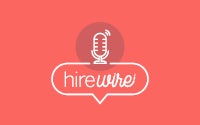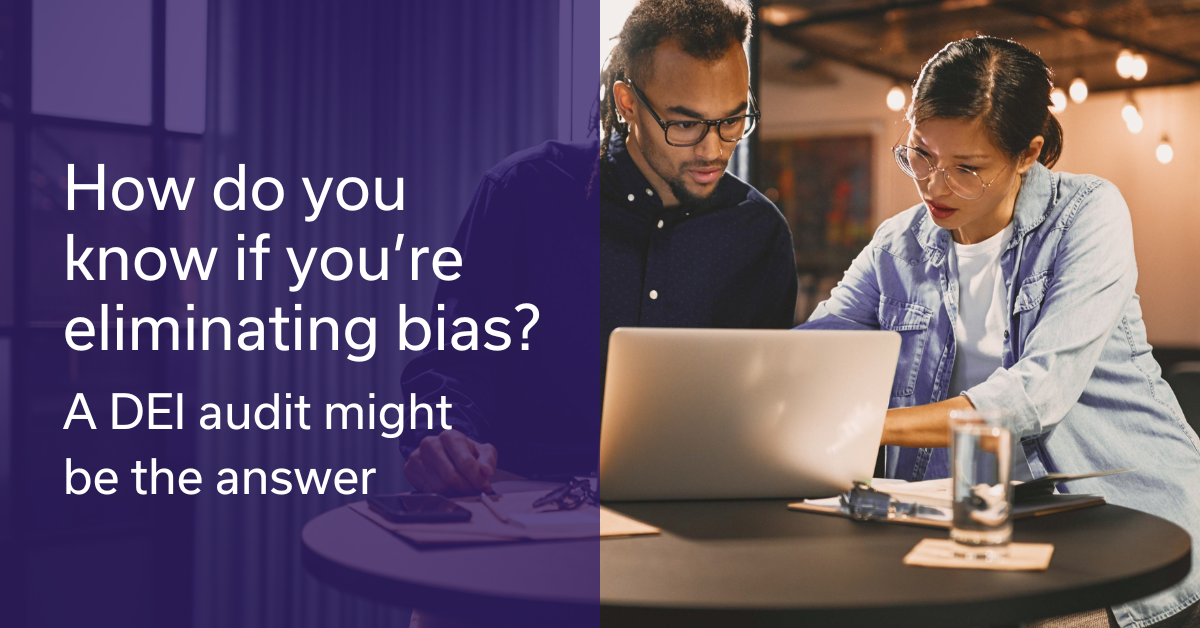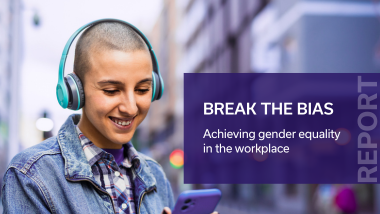How do you know if you’re eliminating bias? A DEI Audit might be the answer
Diversity, equity, and inclusion (DEI) has been a hot—yet often misunderstood—topic for years now. So, what is DEI? Often mistakenly thought of as a one-time initiative, DEI is actually an accumulation of many efforts to create a workplace that accommodates every employee. It includes practices, policies, programs, and strategies meant to enable a diverse, equitable, and inclusive environment.
DEI looks at individual factors to ensure everyone is safe, respected, and included. These attributes commonly include:
- Race/ethnicity
- Gender identity
- Age
- Religion/Faith
- Sexual orientation
- Nationality
- Physical abilities, disability, and neurodiversity
- Veteran status
- Socioeconomic status
Prioritizing DEI has many well-known benefits, from businesses experiencing more innovation and higher employee engagement to a better bottom line. In fact, a study by McKinsey revealed that organizations with the most ethnically and culturally diverse boards were over 40% more likely to have higher profits. This is in stark contrast to companies with low diversity across gender, culture, and ethnicity, which are 29% less likely to have above-average profitability.
These are only a few of the many reasons to double down on your DEI efforts. We’ll explore the impacts DEI can have on your business and how you can transform your approach to eliminate bias and focus on being a truly diverse, equitable, and inclusive workplace. Not sure where to start? We’ll also show you how a DEI audit can show you what you don’t know and drive meaningful and powerful change within your organization.
Why DEI Matters
We all know that being fully inclusive and embracing a diverse and equitable workplace for all is the right thing to do. But it can also be a smart business move for organizations that do it right. We’ve briefly looked into a few benefits, but here are a few more reasons to prioritize DEI.
1. You more accurately represent your customer base
Do all of your customers look the same? Do they all come from the same background? Probably not. So why build a workforce that looks nothing like your customer base? When your team is diverse, it’s more representative of the world we live in, and, likely, your customers. Not only can this help customers feel good about working with you, but it also provides a wealth of differing thoughts and ideas.
When your teams look like your existing customers and potential new customers, it can open doors to new markets. And that’s exactly what happens with diverse companies. They’re 70% more likely to capture a new market, but what’s even more incredible is that organizations with a high level of diversity are 45% more likely to report an increased market share year-over-year.
2. Your employees want to stay
With the post-2020 pandemic mass exodus known as the Great Resignation, employee retention has become more crucial than ever. After employees left their companies for greener pastures, businesses were left fighting for top talent. You can combat this by keeping your employees happy, and, as it turns out, DEI can help.
According to Forbes, an inclusive environment that fosters belonging supports empathy for others, leading to increased team-building and more positive relationships among colleagues. This increases employee satisfaction, which leads to higher retention. When employees feel connected, they also work harder and are more committed to your company for the long haul.
3. Your teams are more innovative
Do great minds really think alike? Studies suggest the answer is no. Businesses rich in diversity innovate faster due to diversity of thought and experiences. In these environments, teams respect each others’ varying perspectives, have more creative ideas, and keep open minds—all of which contribute to innovation.
Coworkers in inclusive workplaces may feel more comfortable sharing out-there ideas that may lead to innovation that reaches a broader customer base, making your business even more competitive. The more varied your team, the more likely they are to innovate—and fast.
4. You enjoy higher profits
The financial advantages are often the most talked about benefit of improving DEI—and for good reason. Organizations with high levels of diversity and inclusion are up to 120% more likely to reach their financial goals. Countless studies confirm organizations outperform less diverse companies financially:
- Their faster innovation across products and services to meet customer needs contributes to diverse companies that financially outperform others.
- Harvard Business Review showed that businesses with more diversity report 19% higher revenue than less diverse organizations.
- A study conducted by Gartner predicts that 75% of organizations with strong DEI at the management level will surpass financial goals.
- Companies in the top quartile for gender, racial, and ethnic diversity are 25% more likely to be more profitable.
There are countless reasons to execute a DEI strategy. But if you’re unsure where to start or want to ensure your company is truly diverse, equitable, and inclusive, conduct a DEI audit. It’s one thing to optimize your strategy, but it’s another thing to start at the very beginning: before you even begin hiring.
We’ll explain a DEI audit, why you likely need one, and why it should start with your recruiting process.
What is a DEI audit?
Simply put, a DEI audit evaluates where you can eliminate bias and actionable insights that direct you towards a more diverse, equitable, and inclusive workplace. At Resource Solutions, our comprehensive DEI audit focuses specifically on the recruiting process and how you can rethink your approach to be fully inclusive.
Why you should conduct an audit
You already know the benefits of an organization rich with employees from different backgrounds, but to reap those benefits, you first have to build that diverse company. A DEI audit gives you the insights you need to make it happen. Here’s how:
- It looks at your business through eight diversity lenses to identify where you can improve.
- It evaluates your current state and maps how to achieve a better future state by comparing you to competitors and other top organizations.
- It provides a framework for how to measure DEI in your organization.
- It offers insights into systemic problems that could hinder your ability to attract and retain top talent.
A new approach to DEI audits
From day one, DEI has been a guiding light for Resource Solutions and how we approach the recruiting process. However, it wasn't until recently that we launched our DEI consulting services, including our DEI audit.
The Black Lives Matter (BLM) movement caused ripples not only in the United States but globally, too. It led many people and businesses to reflect on what we can do better and how we can affect change. BLM was a wake-up call for organizations, including Resource Solutions. We even audited ourselves first to glean insights and make any necessary changes.
Shortly after the start of the movement, we rolled out our DEI consultancy services to help organizations like yours remove bias from the recruiting process and keep diversity at the forefront of business decisions.
Our audit looks through your end-to-end recruiting process through eight DEI lenses:
- Gender
- Ethnicity
- Disability/neurodiversity
- LGBTQ+
- Age
- Faith
- Socioeconomic status
- Veteran status
We look at everything so you can fix every part of your process, not just one.
Step 1: Start from the pre-apply process
Have you thought about what your candidates do before they land on your careers page? With a wealth of resources, like Glassdoor and InHerSight, job seekers are learning more about your business before they decide whether they want to work with you.
We examine the third-party sources your candidates may visit before they head over to your careers page, as what they read there could shape their opinion of your organization and if they continue to your website.
Step 2: Explore every step of your recruiting process
Through our eight DEI lenses, we examine 11 stages of the recruitment process in our end-to-end impact audit to ensure you're removing bias. After a thorough audit, we will give you:
- Reports that look at a minimum of 177 touchpoints along the recruitment process and at least 44 recommendations based on academia and the latest DEI findings.
- Recommendations for incremental changes that have a monumental impact.
- Examples of companies doing DEI right.
- Reports that show if there's bias, and if there is, a deep dive into the specific areas of bias, including the ever-changing DEI landscape.
What to expect
Comprehensive audits can be incredibly beneficial for your business—but they can also be overwhelming—which is why we do the heavy lifting. Our audits don't cost hundreds of thousands of dollars to implement, nor do they require a hefty time commitment.
We'll spend five weeks conducting our audit. All we need from you is 90 minutes to gather documentation and fill out our questionnaire. We know you're busy, so we do our best to limit your time investment. And once we're done, it might surprise you how quickly you can implement small changes that have a substantial impact.
To get an idea of what you might receive in your reports, here are a few examples:
- Recommendations and small changes. An example might be to humanize the equal opportunity statements on your website to highlight your dedication to diversity.
- Intelligence. We don't know what we don't know (innocent ignorance). We'll shine a light on where bias exists and show you how to improve. For example, you may not have thought about digital poverty, so you only make your job applications available on iOS devices, which can exclude much of the talent pool.
When you should think about an audit
When you partner with a consultant to conduct your DEI audit is entirely up to you. Some organizations proactively seek to improve their DEI efforts to increase diversity of thought, which leads to more innovation, higher retention, and increased profitability. Others recognize they have a problem and want to start on their DEI journey by first identifying their shortcomings.
There is no right or wrong time to audit your business. However, most of our clients come to Resource Solutions at the start of their diverse hiring challenges. Or when they're looking to revamp their recruiting efforts to be more inclusive and ensure they have removed bias at every stage of your process.
Are you ready to prioritize DEI?
Now more than ever, candidates are scrutinizing businesses and their DEI practices. Talent wants to work for organizations that align with their values and prioritize what's important. If they sense bias within the recruiting process, they might find somewhere else to work.
So, if you want to build a more diverse workplace and ensure you're fully inclusive, from the pre-apply process through onboarding, it's time to conduct a DEI audit. After the audit, we'll send actionable recommendations based on academic research. We'll explore your recruiting process through our eight diversity lenses that allow you to make meaningful changes.
Are you ready to get started? Contact us today to see how we can help you prioritize DEI within your organization.













